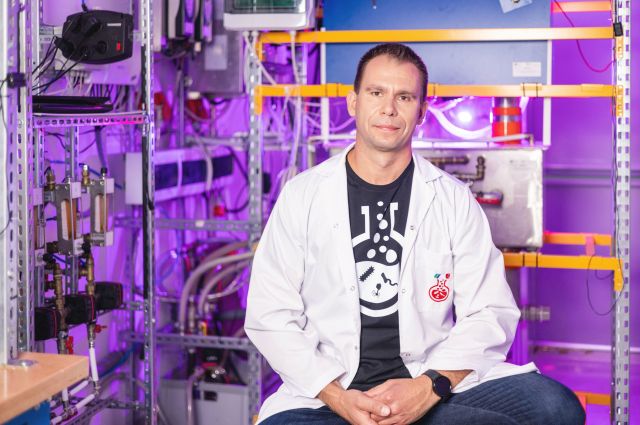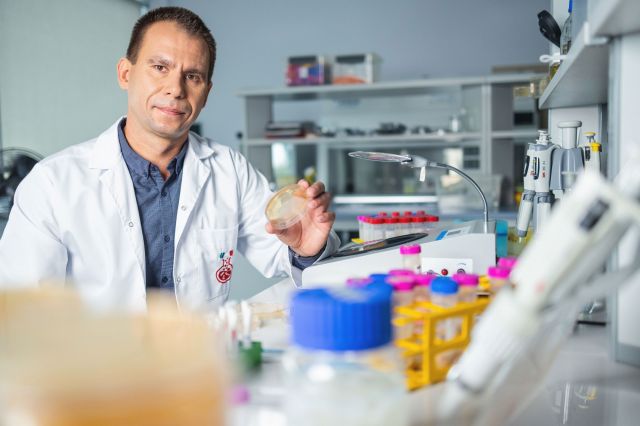Principal Investigator
:
Prof. Dr hab. Karol Fijałkowski
West Pomeranian University of Technology in Szczecin (ZUT)
Panel: NZ6
Funding scheme
: OPUS 14
announced on
15 September 2019
Bacterial infections caused by organised microbial communities, known as biofilms, have been a growing, complex and multidisciplinary medical issue. Such structures are covered by a protective extracellular matrix, which makes it significantly more difficult for antibiotics and antiseptics to reach bacterial cells that are hidden inside it. This is one reason why biofilms exhibit up to 1000 more resistance to antimicrobial agents than cells of the same microorganism in free-swimming (a.k.a. planktonic) form (without the protective matrix layer). Despite significant progress in science and technology, there are still no sufficiently effective methods of preventing and combating infections caused by biofilms.
 Prof. Karol Fijałkowski, photo by Michał Łepecki
In our earlier research, we discovered that a Rotating Magnetic Field (RMF) of specific parameters increased the antimicrobial activity of antibiotics and antiseptics against pathogenic biofilms. We realised this discovery might be of fundamental importance for the development of innovative methods of preventing and combating biofilms, but for this to happen, we needed to elucidate the mechanisms behind the effects we had observed. Accordingly, the primary goal of this project was to explain the mechanisms of this increased activity of antimicrobial compounds, antiseptics and antibiotics, against bacterial biofilms in the presence of RMF.
Prof. Karol Fijałkowski, photo by Michał Łepecki
In our earlier research, we discovered that a Rotating Magnetic Field (RMF) of specific parameters increased the antimicrobial activity of antibiotics and antiseptics against pathogenic biofilms. We realised this discovery might be of fundamental importance for the development of innovative methods of preventing and combating biofilms, but for this to happen, we needed to elucidate the mechanisms behind the effects we had observed. Accordingly, the primary goal of this project was to explain the mechanisms of this increased activity of antimicrobial compounds, antiseptics and antibiotics, against bacterial biofilms in the presence of RMF.
Research was performed with the aid of RMF generators constructed within the framework of a previous project, “Lider V”, funded by the National Centre for Research and Development.
Using advanced spectrometry techniques, we showed that the RMF changed the chemical composition of the biofilm matrix, i.e., causing it to become more porous, as seen with electron microscopy. We also observed changes in protein concentrations in the cell walls of bacteria exposed to the RMF, and showed differences in their metabolism manifesting, for instance, in changed concentrations of information-transmitting molecules. We proved that the effect of the RMF (in the absence of any antimicrobial compound) was manifested on a spectrum of relatively subtle changes that accumulated primarily in external cellular structures, cell walls and membranes, and the biofilm matrix. The activity of the RMF was so subtle that the cells were able to eliminate damage relatively quickly, which meant there was no lasting post-exposure effect. However, once an antibacterial agent was introduced into bacterial cultures exposed to the RMF, especially an agent designed to alter cell wall structures, its efficacy was significantly increased, as evidenced by a rise in the number of dead cells. This RMF-induced increase in the efficacy of the antimicrobial agent was also observed at lower concentrations and with shorter contact time, as opposed to the effects achieved in a set-up that had not been exposed to the RMF. We determined that the increase in efficacy was due to a number of changes induced by the RMF in the morphology of bacteria, as well as their metabolomic and proteomic processes, which meant that the antimicrobial agent acted against functionally- and structurally-weakened cells and, in the case of biofilms, also a partially degraded matrix.
The project was carried out in a consortium with the Łukasiewicz Research Network – PORT Polish Centre for Technology Development. The PI on the partner side was Dr hab. Adam Junka, Professor at the Medical University Wroclaw.
Project title: Analysis of mechanisms of increased efectivness of antimicrobial substances against biofilms in the presence of a rotating magnetic field
Prof. Dr hab. Karol Fijałkowski
Microbiologist, academic teacher, professor of Physical and Life Sciences, specialised in biology and biotechnology. Head of the Department of Microbiology and Biotechnology at the ZUT Centre for Nanotechnology Research and Education in Szczecin. Together with his team, he has conducted interdisciplinary research into the impact of magnetic fields on microbes. His current research interests are focused on using magnetic fields to increase the efficacy of antimicrobial agents against pathogenic bacteria.


